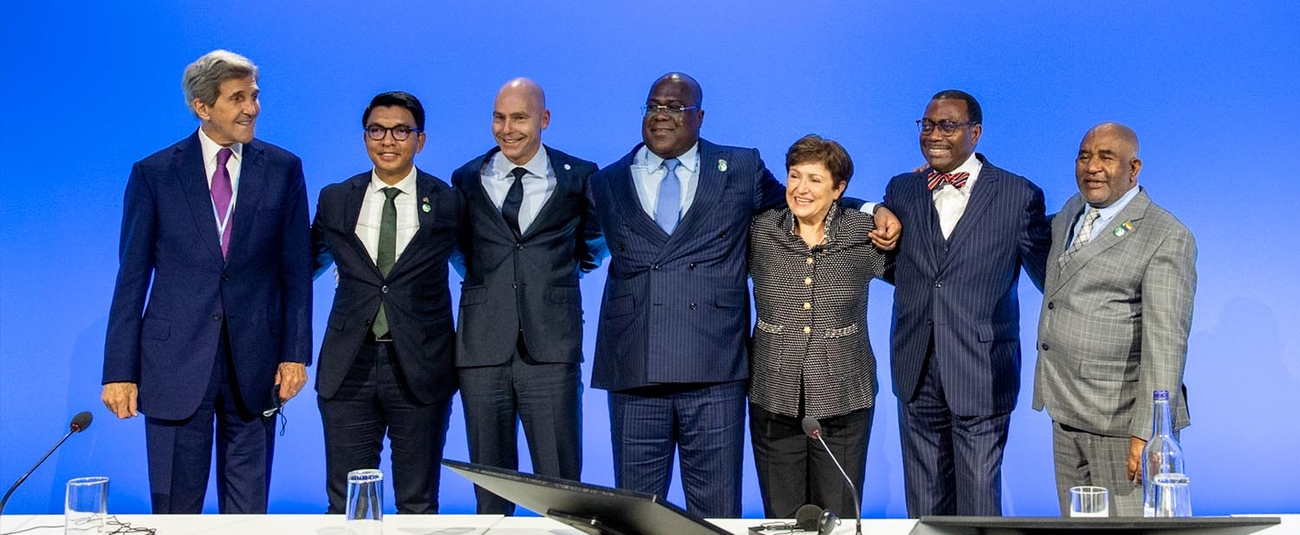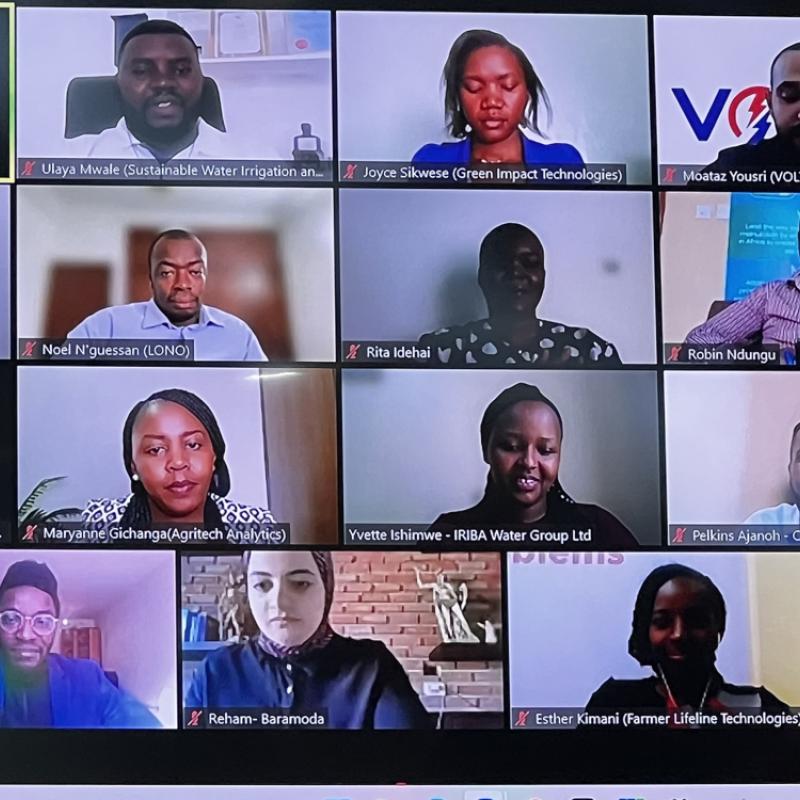
AAAP in the Media
Displaying 1 - 6 of 6
Africa Adaptation Acceleration Program Partnerships Forum
What: Africa Adaptation Acceleration Program Partnerships Forum
Who: African Development Bank and the Global Center on Adaptation
When: 27 October 2022, 15:00 GMT+2
Where: Windhoek, Namibia (Hybrid format)
The African Development Bank and the Global Center on Adaptation, with the support of partners are convening the Africa Adaptation Acceleration Program (AAAP) Partnerships Forum at the 10th Conference on Climate Change and Development in Africa. This will take place on 27th October 2022 in Windhoek, Namibia.
The Forum invites partners to showcase their adaptation work in Africa, align and seek opportunities for scaling up their activity, and raise awareness of relevant initiatives being implemented, connected to the four thematic pillars of the AAAP.
The Forum, to be organized in hybrid format, is designed as an interactive dialogue with participants from public institutions, regional and international organizations, financial institutions, research institutions and academia. The private sector, non-governmental organizations, civil society, and young people will also be represented.
The Forum will provide opportunities for new connections and inputs. It also aims to learn from partners, share innovative approaches and provide an update on AAAP programs and projects.
Register here to join the Africa Adaptation Acceleration Program Partnerships Forum online.
20 young African entrepreneurs bag $100,000 each to boost their climate adaptation businesses
Digital Climate Adaptation Solutions Training – Southern Africa
Harnessing the power of technological innovations and digitalization to improve agricultural productivity and strengthen climate resilience has been recognized as one of the potential game changers to address many of pressing climate concerns and rural transformation challenges facing Africa today.
Digital climate-informed advisory services are tools and platforms that integrate climate information into agricultural decision-making. These services range from digital mobile apps, radio, and online platforms to digitally enabled printed bulletins based on climate models and extension services that utilize climate information platforms. DCAS offers crucial opportunities to build the resilience of small-scale producers in the face of worsening climate change impacts, particularly when bundled with complementary services (such as financing, input supply, market access, insurance).
The objectives of the DCAS trainings are as follows:
- Capacity enhancement for agricultural stakeholders across Southern Africa in DCAS
- Supporting trainees to improve their confidence and capacity to design and implement DCAS projects to reach the last mile and farmers for improved food security and climate resilience
- Facilitating knowledge/experience sharing of participants on contextual issues and approaches to scale up DCAS
- Increase the knowledge of stakeholders from across Southern Africa on opportunities and new approaches for the design, mainstreaming and use of digital tools and data-enabled agriculture to combat the effects of climate change
- enhancing capacity to use digital agriculture advisory services and solutions to ensure uptake by of DCAS among stakeholders in Southern Africa
- Over 50 Participants trained in digital agriculture and digital climate adaptation solutions
- A new cohort or platform of African public officials, researchers, farmers organizations leaders and agricultural NGO focal points with improved expertise in DCAS (for subsequent experience capitalization follow up and training)
- Training evaluation assessment report
- Improved understanding / knowledge of target stakeholders in Southern Africa through training and information sharing including lessons learned on the challenges, opportunities and new approaches to the design, mainstreaming and use of DCAS and data-enabled agriculture
- Enhanced capacity of selected agricultural stakeholders in public institutions and farmers groups across Southern Africa to use digital agriculture advisory solutions, implement digital climate smart advisory solutions, and train their members/colleagues to use DCAS tools
€100,000
Programme for Integrated Development and Adaptation to Climate Change in the Zambezi River Basin (PIDACC Zambezi)
Zambezi River Basin, in Southern Africa Region, has the largest drainage basin (1.4 million km2) with rich variety of natural resources, covering parts of eight riparian states namely Angola, Botswana, Malawi, Mozambique, Namibia, Tanzania, Zambia, and Zimbabwe. Despite this potential, riparian states are struggling to cope up with worsening ecological circumstances, environmental degradation, global warming, and climate change, which have created conditions of chronic vulnerability, food insecurity, and economic hardships
The objective of the project is to strengthen regional cooperation in building the resilience of the Zambezi River Basin communities to climatic and economic shocks, through promoting inclusive, transformative investments, job-creation, and ecosystem-based solutions.
- Identified climatic risks to major agricultural value chains and digital technologies that have the potential to accelerate climate adaptation in the Zambezi River Basin
- Prepared national profiles on digital adaptation in agriculture for the various countries of the Zambezi River Basin, a summary of the prevalent adaptation techniques among smallholder farmers, and the key institutional, policy and human capital challenges to digitization
- Actionable design and engagement opportunities, which will mainstream digital climate advisory services into the implementation of the PIDACC program
- Benefit about 800,000 (60% women and 10% youth) within hotspot areas, and indirectly the whole population
- Improved access to water, climate smart agricultural technologies, and community-level infrastructure for irrigation and markets
- Associated benefits include multi-sectoral utilization of shared water resources within the context of integrated land and water resources development and management, gender equality and social inclusion
- Strengthened institutional capacities and mechanisms for coordination of Basin monitoring, planning, and management
- Increased demand-driven community-level feasible climate resilient infrastructure that would support livelihoods
- Reinforced inclusive and diversified climate resilient livelihoods support through enhanced agribusiness and small & medium enterprises (SME) development
- Developed and improved livelihoods, including job creation by enhancing agribusiness through investments in water, sanitation, energy, human capital, and agriculture sectors
- Support adaptive capacity of communities with a view to avoid, reduce and reverse land degradation and effectively manage water
AfDB Investment of USD16.7 million of total USD19.4 Million
Session on Water Solutions for Climate Adaptation: lessons to scale up impactful delivery during the 2023 UN Water Conference
What: Session on Water Solutions for Climate Adaptation: lessons to scale up impactful delivery during the 2023 UN Water Conference
Who: Africa Adaptation Acceleration Program of the African Development Bank and the Global Center on Adaptation
When: 22 March 2023, 18:30 EST
Where: United Nations Headquarters, Conference Room 9
Event description:
The Global Center on Adaptation and the African Development Bank are co-convening a high-level event at the UN 2023 Water Conference. This is the first event of its kind in nearly five decades. It places water at the center of a robust global response to climate change.
The session will dwell on the need to build resilience to climate change across Africa, developing states and vulnerable nations. It will propose proven water solutions for a warming world to advance climate adaptation and a model of delivery to achieve impact at scale. Furthermore, it will share lessons from the model of implementation in the Africa Adaptation Acceleration Program.
It will also serve as a launch pad to highlight the Africa Adaptation Acceleration Program’s achievements within its Water-Urban sub-program and seek its replication as a model in other regions, particularly Asia and small island states.
The high-level dialogue will feature statements and contributions from invited leaders across the fields of global politics and international finance.
African, other world leaders gather for largest summit on climate adaptation at COP26

African and other global leaders came together at COP26 in Glasgow yesterday for the Africa Adaptation Acceleration Summit, the largest summit to date on climate adaptation.
The summit called for the rest of the world to ramp up its support for the African continent as it adapts to the adverse effects of climate change, including devastating human impacts in Madagascar, where 1.3 million people live under food distress following four years of no rain. Madagascar’s situation has been described as the first climate induced drought.
President Félix Tshisekedi of the Democratic Republic of Congo and Chairperson of the African Union led Tuesday’s event. He highlighted the $6 billion in financial commitments for climate adaptation that African countries had put forward in their nationally determined contributions (NDCs) and called for increased funding to produce the additional $27 billion a year that the continent requires.
President Tshisekedi said: “Adaptation finance flowing to Africa is grossly insufficient compared to the enormous resources needed for the continent to adapt to climate change. That is why African countries, working with the Global Center on Adaptation, the African Development Bank, and other partners, launched the Africa Adaptation Acceleration Program (AAAP). The program lies at the heart of Africa’s climate change needs. It is Africa-owned and Africa-led. African nations have endorsed it as Africa’s preferred mechanism to deploy adaptation finance for adaptation projects in Africa.”
African Development Bank Group President Dr Akinwumi A. Adesina said: “The Africa Adaptation Acceleration Program is a game changer for Africa to deliver results and impacts on adaptation, fast and at scale. It will support 30 million farmers with digital climate advisory services. The Technologies for African Agricultural Transformation program supported by the African Development Bank and the Bill and Melinda Gates Foundation has already delivered climate resilient technologies for 11.2 million farmers in just two years.”
He added: “With the Africa Adaptation Acceleration Program, we expect to reach 40 million farmers. We plan to support farmers in producing 100 million metric tons of food, which will be enough to feed 200 million people and reduce hunger by 80%.”
Moderating summit proceedings, Patrick Verkooijen, CEO of the Global Center on Adaptation, underscored the urgent need for accelerated climate adaptation action across the continent: “COP26 must deliver on the promises of Paris,” he said. “We are failing and we are failing Africa. We must bring more ambition and more finance to help Africa adapt to the pace of a climate emergency devastating the continent with increasingly serious consequences for the world’s poorest and most vulnerable,” the GCA CEO added.
COP26 President Alok Sharma announced $197 million in new funding for adaptation for Africa from the UK government. Of this amount, $27 million will support the Africa Adaptation Accelerated Program upstream facility to deliver technical assistance and a pipeline of bankable projects. The package is expected to unlock almost $1.2 billion for climate adaptation in Africa. Sharma said there will be more to come.
US Secretary of State Antony Blinken also announced new funding for climate adaptation from the United States government. He said the US President would work with the US Congress to dedicate $3 billion annually in adaptation finance by the year 2024. This is the largest commitment ever made by the US to reduce the impact of climate change in those most endangered by it around the world.

